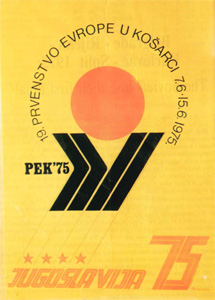EuroBasket 1975 Last updated September 26, 2025 International basketball event
International basketball competition
The 1975 FIBA European Championship , commonly called FIBA EuroBasket 1975 , was the nineteenth FIBA EuroBasket regional basketball championship, held by FIBA Europe .
First round Pos. Team Matches Wins Losses Results Points Diff. 1. Spain 3 3 0 270:203 6 +67 2. Bulgaria 3 2 1 235:218 4 +17 3. Romania 3 1 2 199:237 2 −38 4. Greece 3 0 3 195:241 0 −46
Second round 1975 FIBA EuroBasket champions Yugoslavia
Team rosters 1. Yugoslavia: Krešimir Ćosić , Dražen Dalipagić , Mirza Delibašić , Dragan Kićanović , Zoran Slavnić , Nikola Plećaš , Željko Jerkov , Vinko Jelovac , Damir Šolman , Rato Tvrdić , Rajko Žižić , Dragan Kapičić (Coach: Mirko Novosel )
2. Soviet Union: Sergei Belov , Alexander Belov , Ivan Edeshko , Alzhan Zharmukhamedov , Mikheil Korkia , Aleksander Sidjakin , Valeri Miloserdov , Yuri Pavlov , Aleksander Boloshev , Aleksander Salnikov , Vladimir Zhigili , Aleksander Bolshakov (Coach: Vladimir Kondrashin )
3. Italy: Dino Meneghin , Pierluigi Marzorati , Carlo Recalcati , Renzo Bariviera , Renato Villalta , Ivan Bisson , Lorenzo Carraro , Fabrizio della Fiori , Marino Zanatta , Gianni Bertolotti , Giulio Iellini , Vittorio Ferracini (Coach: Giancarlo Primo )
4. Spain: Juan Antonio Corbalán , Wayne Brabender , Clifford Luyk , Rafael Rullan , Luis Miguel Santillana , Manuel Flores , Carmelo Cabrera , Cristóbal Rodríguez , Jesus Iradier , Miguel Angel Lopez Abril , Juan Filba , Miguel Angel Estrada (Coach: Antonio Díaz-Miguel )
This page is based on this
Wikipedia article Text is available under the
CC BY-SA 4.0 license; additional terms may apply.
Images, videos and audio are available under their respective licenses.

